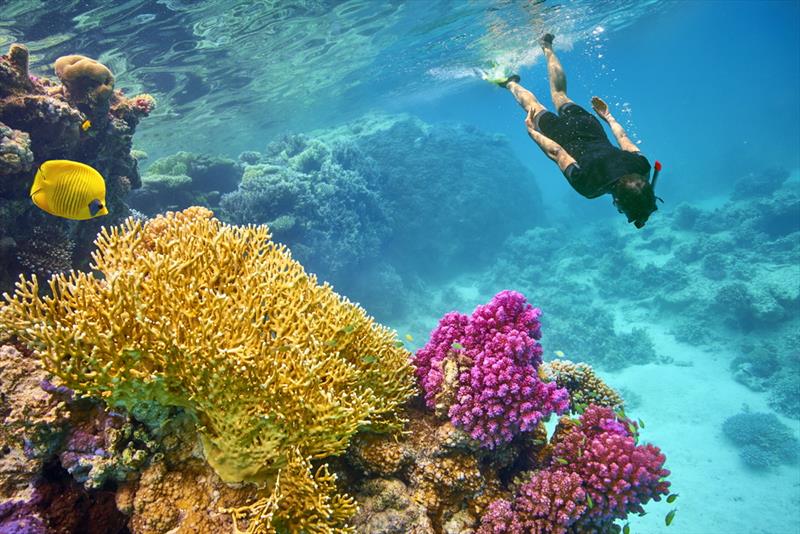
Ten ways you can help save the oceans
by Sailors for the Sea 17 Oct 2021 00:39 AEDT

Help save the oceans © Sailors for the Sea Powered by Oceana
Oceans cover 71 percent of the planet and are home to important species and ecosystems that we rely on for food, livelihoods, climate regulation and more. But the oceans need our help. Saving the oceans can sometimes feel like an overwhelming task, but if we all pitch in, we can make a big difference.
Here are 10 lifestyle choices that - when adopted - can help protect and restore our oceans for future generations.
1. Demand plastic-free alternatives
The oceans face a massive and growing threat from plastics. An estimated 17.6 billion pounds of plastic leaks into the marine environment from land-based sources every year—that's roughly equivalent to dumping a garbage truck full of plastic into our oceans every minute. And plastics never go away!
We must urge companies to provide consumers with plastic-free alternatives and say no to single use plastics such as straws, plastic cutlery, coffee cups, water bottles, plastic bags, balloons, plastic-wrapped produce and take-out food containers.
2. Reduce your carbon footprint
Carbon dioxide, a known greenhouse gas, is making our oceans more acidic. This is contributing to the loss of corals on a global scale as their calcium skeletons are weakened by the increasing acidity of the water.
You can reduce your carbon footprint by adopting some of these simple measures:
- Ride a bike, walk or use public transportation rather than driving a car.
- Turn off the lights when you leave a room.
- Put on a sweater in the winter instead of turning up your thermostat.
- Have some fun with your diet - buy sustainably caught wild seafood. It is a renewable resource that requires minimal freshwater to produce and emits less carbon dioxide than land-based proteins like beef.
3. Avoid ocean-harming products
There are many products directly linked to harming endangered or threatened species, unsustainable fishing methods and pollution. For example, avoid cosmetics that contain shark squalene, jewelry made of coral or sea turtle shell, souvenir shells of conchs, nautiluses and other animals, and single-use plastics like straws and water bottles that can end up in our oceans. These products support unsustainable fishing and threaten important species and ecosystems.
4. Eat sustainable seafood
Choose seafood that is healthy for you and the oceans from well-managed, wild fisheries. We know it's hard to know what fish are okay to eat, which is why you can turn to these helpful resources:
5. Vote on ocean issues
Electing public officials that support good ocean policies can help us protect marine life and our oceans. Do your research on candidates and make an informed decision, then exercise your right (and responsibility) to vote. And don't let Election Day be the last time they hear from you. Follow up with your candidates and elected officials regularly to remind them of policies you care about.
6. Contact your representatives and lawmakers
Your representatives and lawmakers might not know how important these issues are that face our oceans. But they will if you tell them. It's up to constituents like you to make lawmakers aware of the crises facing marine life and our oceans. Don't be shy! Take action with Oceana to directly contact your government representatives and lawmakers.
7. Explore the oceans
"People protect what they love." - Jacques-Yves Cousteau
Get outside and explore the oceans around you! If you don't live near the ocean, visit your local lake or river to learn how your watershed connects to the ocean. There are plenty of online opportunities to explore the oceans, too. Dive into Oceana's Marine Life Encyclopedia to read fun and interesting facts about all kinds of animals from sharks and seals to octopuses and clownfish.
8. Leave nothing behind
As beach crowds increase, so does the amount of trash left behind or blown away. Don't let your day outside contribute to the destruction of our oceans. Remember to leave nothing behind but your footprints -- collect and dispose of your trash.
9. Share your ocean heroics with friends, family and coworkers
Tell people what's going on with the world's oceans and what they can do to join you in making a difference. Spread the word about petitions, share fun facts and join the conversation with us on Facebook, Instagram, Twitter and YouTube.
10. Join Oceana
More than 800,000 members and activists in over 200 countries have already joined Oceana - the largest international organization focused solely on ocean conservation. Together, we've won over 200 victories and protected more than 4 million square miles of ocean. But there's more to be done! Become an Oceana Wavemaker and continue your efforts to help save the oceans. As a Wavemaker, you'll receive a monthly update on the latest ocean news and learn ways you can help protect marine life.